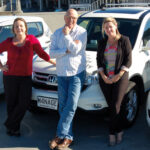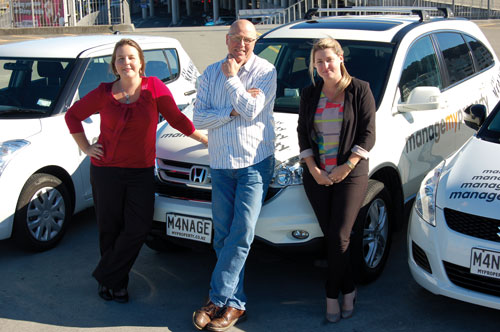Business Supermodel
The franchise business model is still responsible for kick-starting business careers all over the country. Patricia Moore has this update for franchise buyers.
The franchise business model is still responsible for kick-starting business careers all over the country. Patricia Moore has this update for franchise buyers.
Owning your own business – it’s the Kiwi dream. And with franchising it’s possible to ‘own’ a nationally, even internationally, known brand with a proven system, marketing expertise and ongoing support that allows the business owner to get on with growing the business.
The franchise sector plays a significant role in our economy. Results from Franchising New Zealand 2012, a survey conducted by Massey University in conjunction with the Griffith Business School in Brisbane, indicate an estimated annual turnover of around $20 billion for the sector. With a population of just 4.4 million, we support 446 franchise brands and around 22,400 franchisee businesses employing something like 100,000 people.
According to WHK’s National Business Advisory Group, the franchise sector continues to improve, albeit slowly. “Property-related franchises in many parts of the country are seeing positive growth and new franchise groups are emerging.”
Advisory group consultant Tracy McElroy-Rivett says they’re also seeing franchise investors and employees changing franchise groups. “This is because they’re seeing more potential in another brand and want to be best placed to take advantage of the continuing upswing.”
The post-earthquake recovery in Christchurch means new franchises are finding plenty of opportunities in retail, property and construction. In Wellington activity has increased in the past six months, particularly in the hospitality/retail area. (Wellington it seems, has a vast number of franchisors but not a lot of franchisees.)
In Auckland, industry specialists report an upsurge in activity, particularly in the hospitality and service/maintenance industries. “Offshore franchises are coming into Auckland and establishing their first franchises,” says McElroy-Rivett. “The banks continue to look favourably on the franchise model for funding.”
Finance isn’t really an issue for the stronger, better known brands, or for potential franchisees who do appropriate due diligence, says Westpac’s national franchising manager Daniel Cloete. “Where a brand does not have the figures to prove debt servicing (the banks’ primary interest) the way we structure the funding might be different. We’re still keen to do the lending.”
Cloete says recent franchise confidence surveys and their talks with franchisors and franchise specialists indicate “cautious optimism about the prospects for growth this year.”
He also highlights Christchurch opportunities. “Mark Schrader, the local Westpac franchise manager, has noted a lot of increased activity as the city enters the construction phase. It all means lots of opportunity for people looking to buy into new or existing franchise businesses.”
Where to begin?
There’s a lot more to becoming a franchisee than liking the taste of the coffee or having an affinity with kids or pets. Making a wise franchise buying decision depends on the answers to a number of questions, says Cloete. He suggests starting with a copy of Westpac’s step-by-step ‘Guide to Franchising’ or attending one of their franchise-related seminars.
The autumn Franchise NZ magazine and website highlight key areas editor Simon Lord believes potential franchisees should address. “The process starts with finding out about yourself – what are your skills and aptitudes?”
The industry and the options within the industry come next, then the particular franchise.
At that point, says Lord, a potential franchisee needs professional advice. “You need to talk to a specialist franchise banker – all the main banks have franchise teams – and you need to talk to an accountant and a lawyer with franchise experience. All these people will bring an additional perspective to the business and to your decision.”
Existing franchisees are a valuable source of information too, says Lord. “They’re living the life you want.”
Buying a franchise is a complex decision and one you want to get right, says Dr Callum Floyd of Franchize Consultants. “It’s a decision that has long-term consequences for personal life and wealth.”
Floyd, whose doctorate was awarded for his research into franchising, says if he was buying a franchise he’d look at the following:
• Financial returns – how much money can be made from operating profits and future resale, commensurate to the investment required.
• The business model – is it configured to deliver the customer value proposition and ultimately produce profit? Is it well organised and will it withstand the test of time? Some franchise brands are much better organised and provide more valuable support than others, says Floyd.
• Marketing – will the franchise help you acquire and keep customers, cost-effectively? “You may be surprised to know that only a small proportion of franchise systems have mastered the marketing function within their business,”
• Initial and ongoing support – is the infrastructure there to get you established as fast as possible to run a profitable operation? “Ask lots of questions to determine what’s provided and compare the answers with those provided by different franchises.”
• Franchisor viability – “The successful franchising journey involves franchisee and franchisor being there at the beginning and at the end. I would want to be confident it’s going to be around long-term. As with business viability generally, franchisors of new concepts and small franchisors have a greater risk of failure.” Bigger isn’t necessarily better either, says Floyd. “Business models need to be able to adapt to a changing environment to remain relevant and profitable.” He cites video rental, pizza delivery and book stores as ‘challenged’ business models. He also advises potential franchisees to ensure the franchisor is a member of the Franchise Association of NZ.
The great thing about buying a franchise is that the model already exists and has elements of consistency, says McElroy-Rivett. “You can turn this to your advantage by studying almost identical businesses in similar locations – but you need to get access to the right information and the right people to do this; the right accountant should be able to help you.” (It’s worth noting that given modern technology – particularly cloud systems – specialist advice need not be sourced locally. It can come from almost anywhere in the country.)
Advice invaluable
Diane Gurney, who recently opened the first of the new style Muffin Break franchises in Pukekohe, says the advice from her accountant, Craig Weston at Inspired Business Solutions, has been invaluable.
It was important to her that the business advisors she chose had franchise skills “so that we were talking the same language.” With no business background she chose a franchise that would provide the necessary in-depth training (two weeks in Sydney’s Muffin Break ‘shop-type’ environment) but says “the real training comes when you’re actually in the business and running it yourself.”
Gurney spent a lot of time on due diligence. “I really dug deep. If you’re investing a lot of money it’s too late further down the track to say ‘Oh, I didn’t know that’.” Franchisees also need to fully understand the rules that apply within the franchise – “what you can and can’t do.”
Simon Lord says after 20 plus years of publishing advice on franchising, he’s still frustrated by the number of people who admit they didn’t do enough due diligence. “That doesn’t mean they’re not successful or that they’re unhappy. But they recognise they may not have done enough research before buying.”
Spotting opportunities
While a lot of successful brands depend on caffeine for their buzz, franchise opportunities come in all shapes and sizes. And, in spite of recent reports suggesting coffee may be losing its froth, Lord doesn’t believe the market has gone flat. “But it’s changing and the fastest growing part of the café market at present is mobile.”
Lord’s magazine and website list a number of areas he believes are worth the attention of potential franchisees. Waves of opportunities continue to emerge, he says “but the big difference since franchising took hold here in the 1980s is the way people are shopping, communicating and interacting.”
Becoming part of a franchise operation can, even in the current challenging business environment, see the Kiwi dream come true. But due diligence is essential – regardless of the brand. It won’t guarantee success, but it will give you the confidence to sign on the dotted line or walk away.
And, says Dr Floyd, the outlook for franchisees is positive with Franchize Consultants’ most recent Franchising Confidence Index (April 2013) demonstrating much improved optimism across many key franchising growth drivers.
“We’re most buoyed by franchisor’s increase in sentiment for franchisee profitability. The net positive 44 percent reported by franchisors is the series record and an indicator that franchising could be set to deliver growing returns to franchisees.”
Patricia Moore is an Auckland-based freelance writer.
Email [email protected]
Websites to visit:
www.franchize.co.nz
www.westpac.co.nz
www.franchiseassociation.org.nz
www.franchise.co.nz
www.refreshrenovations.co.nz
www.muffinbreak.co.nz
Case study: Building Business
Richard Wood arrived in New Zealand from the UK in 2009 and had barely put his feet on the ground before he established his own building company. The work flowed in but just 18 months later he signed on as a Refresh Renovations franchisee.
So why the change of business model?
“I realised I could have spent years building my business, built a lot of houses and done a lot of renovations, but I wouldn’t really have had anything to sell. I was only really as good as myself.
“When you’re buying a franchise you’re buying and growing an asset. That was a big thing for me.”
Being part of a national brand was also a huge attraction, says Wood. “Running my own small business I could never have found the resources to create a national brand.”
Nor could he hope to enjoy the marketing power and the group buying power that comes with a franchise.
Wood says he knew little about franchising – it’s not big in the building sector in the UK, he says. He carried out as much market research on the renovation market as possible – using the Internet, talking to people he knew, then meeting the people who were behind the actual franchise, before getting to the stage where his lawyers, who had franchising expertise, began “going through the franchise agreement with a fine tooth comb.”
Importantly they were asking questions of him as well as the franchisor’s lawyers. “Was it truly what I wanted? Did I thoroughly understand the obligations I was signing up to?
“They’re good obligations but you need to make sure it’s exactly what you want.”
Spend some time with an existing franchisee, he says. “One that has been trading for some time. And try and find a franchise owner that’s in a similar career position. Suddenly you’re going to be a business manager. You become your own sales person. You need to understand the systems and processes. And don’t rush into it.”
Wood rates the quality of the training and support offered by the franchise as more important than relevant business skills or experience, and says buying a franchise can be the ideal solution for someone wanting to escape the corporate sector.
“With franchising you’ve got head office holding your hand and showing you the right direction. You have flexibility of working hours – mind you, your own business can soon become seven days a week, franchise or not!”
Wood owned two Refresh Renovations franchises and was their 2012 Franchisee of the Year. However he recently recognised he was “in danger of spreading myself a little too thinly” and is moving on to another franchise opportunity within the building industry.
Call him a serial franchisee, but his experience has convinced him it’s a great business model. “It’s your own business. You’re pretty much in charge of your own destiny. And, with so many people dreaming of owning their own business, franchising is only going to grow.”
Showing their stuff
Potential franchisees can check out what’s new and happening at the annual Auckland Franchising Expo this October. “Bookings are good, and we’re also doing more of a push on providers of business services to the franchise industry,” says organiser Brett Rodger.
In April the company’s ‘boutique’ expo in Christchurch – back for the first time since the earthquake – was very successful, he says. “The Christchurch visitors were well qualified and the exhibitors happy with the number and quality of the leads which came out of it.”
A couple of new franchise opportunities were so pleased with the Christchurch event they’ve signed on for Auckland, he says.
“We’re expecting between 70 and 80 franchise opportunities to exhibit in Auckland, plus 30 to 40 service providers.” He says in the apparent absence of any other business-to-business events this year, extra space has been allocated in what is effectively a ‘business-to-business zone’.
All exhibitors are listed on the expo website
www.franchisingexpo.co.nz – giving visitors an opportunity to check them out before they visit.
Site activity soars during the expo says website manager Andrew Moses. “On average we get around 6,000 unique browsers a month. Over the period of the expo this almost doubles. We also get close to 50,000 page views over that time.”






